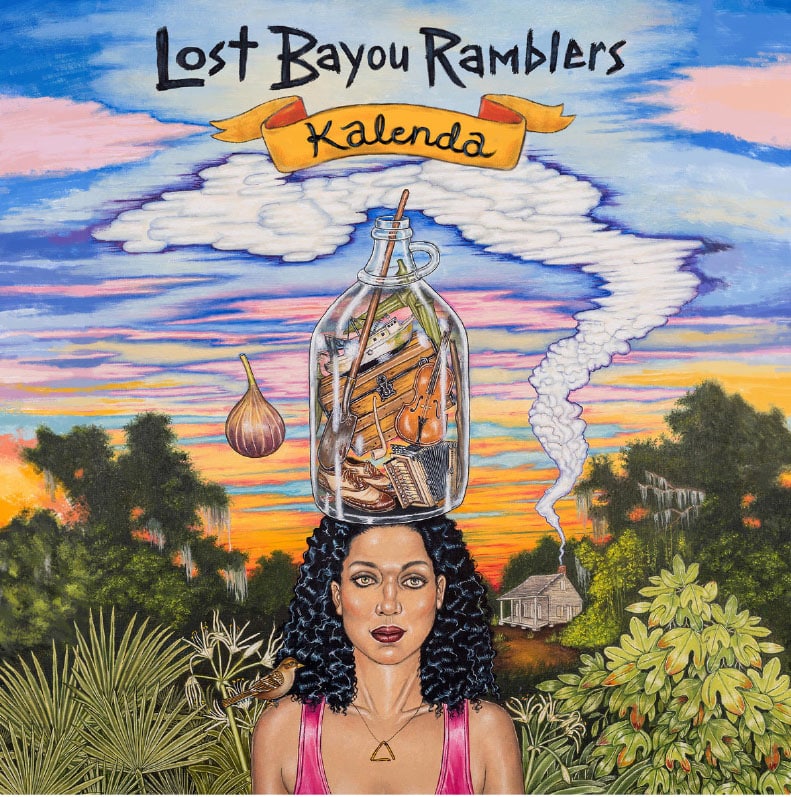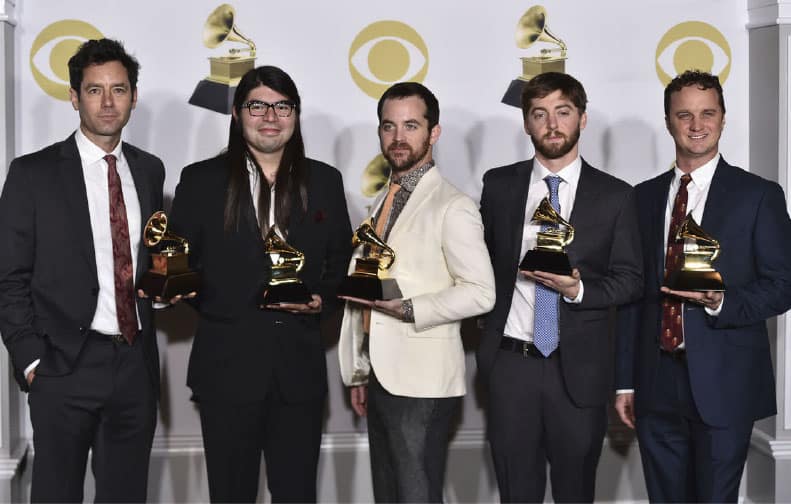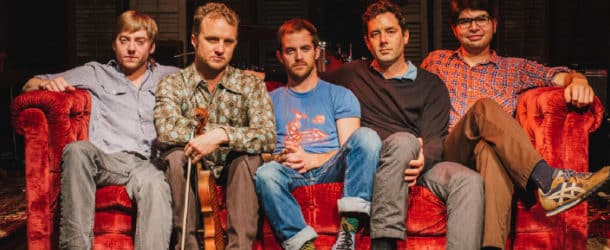A Visit With Louis Michot Of The Grammy-Winning Louisiana Band
By Justin Morris

In fact, distortion as an intentional effect didn’t really hit it big until the early ‘60s when Dave Davies of The Kinks razored up his speakers to get the unmistakable break-up you hear in 1962’s “You Really Got Me.”
Even today, it’s not a sound you would associate with Cajun music, and certainly not with accordions or fiddles … Or would you?
If you happen to be Louis Michot, you would. As the fiddler, front man and band leader of Lafayette’s Lost Bayou Ramblers, Michot, along with co-founding Rambler brother Andre on accordion and lap steel, and a bevy of talented and accomplished bandmates over the years, have shared their very new interpretation of South Louisiana music locally, across the nation and abroad — throughout Canada, to Germany, Belgium, Denmark and Sweden.

This time, their trip to the awards ceremony would be far more gratifying.
We caught up with Louis (that is, “Louie” to any non-French speakers among you), fresh home from the big trip to the Big Apple and already hustling in gear for the next gig in New Orleans at the New Orleans Jazz Market (for a wetlands restoration benefit concert just four days after winning the Best Regional Roots Album Grammy).
Justin Morris: This being your second trip to the Grammy’s, did that change your expectations or hopes this time since you’d already had that experience?
Louis Michot: You know, going alone is just such an exciting journey. You get nominated, and you’re like, “Well, of course I’m going to go.” Just getting nominated is an honor, and the show is just amazing. When we went 10 years ago, the show was unreal. You had Beyoncé with Tina Turner and Stevie Wonder and all kinds of amazing artists that you just don’t get to see, much less together. Even over the years of watching it on TV and not being impressed, I figured this was the 60th year; we’re going to go and have an awesome time, not even expecting to come home with [a Grammy]. Just go for that experience.
But you know, as it kind of built up, people started saying that we really had a chance at this — a big chance — and I was like, “Ya’ll shut up. Just stop it.” (Laughs.) But we got up there, and, man, it started getting really real, leading all the way up to the moment they announced our category and even to that moment they announced “Kalenda!” It still didn’t sound like us. We were waiting to hear “Lost Bayou Ramblers” or whatever, so for a moment, you don’t know what he said, and you don’t think it’s you. And then the next moment, you know it IS you and you’re like [audibly gasps] just … at a loss for breath.
Then we all jumped up. We had a big crew with us from Louisiana — probably 15 or so — so there were a lot of screams. Some categories no one even clapped for, so for us to have this big uproar was amazing.
So, we run up there, because you only have 45 seconds to get there and make your speech and everything. So we got down the stairs. The last person I saw before I got on stage was Sean Ardoin from Lake Charles. [I] got a big high five from him.
And then we were up there. I don’t even remember what song of ours Paul Schaffer and them were playing. I barely remember shaking Zac Brown’s hand. And I just tried to not stumble too much through my “thank you” list. And I forgot a few major ones, but hey, what you gonna do in that situation? (Laughs.)
Honestly, winning was not at all like I thought it would be. At first, it’s just such a huge rush; just “Oh my gosh, I can’t believe this happened.” But then [it starts] to really sink in …
Yeah, winning a Grammy is such a huge thing, and we worked so hard to get to that point. But that’s not even been the goal. The end goal is just to support my family, and keep making music that I love, and keep playing for more and more people that I’ve never played for. To win a Grammy, I mean, it kind of knocked me upside the head. I still haven’t come to terms with it. I keep saying that when it finally comes in the mail, I’ll believe it. (Laughs.) It’s pretty overwhelming.
JM: I can only imagine. So, the record in question here is Kalenda. Let’s talk about where and who it came from.
LM: After Mammoth Waltz, Korey (Richey) and I had to go through a purging of sorts with older members that were ready to move on and such. So Eric Heigle came in as our drummer. [He was] kind of the first of the new lineup, and his first gig with us was American Epic — the Jack White/Robert Redford PBS documentary that came out last year. He stayed with us for a couple of years before he got a gig engineering Arcade Fire’s latest album. That kind of took him away, so we ended up hiring Kirkland Middleton on drums, who was only 20 at the time. When Eric came back, he took over recreating all the samples and digital elements that we do on the record for our live shows.
After that, we got Johnny Campos. His first gig with us was for an episode of NCIS that never aired! (Laughs.) He’s an amazing guitar player and has had many other bands of his own.
After that was Bryan Webre, because Korey Richey, who produced the album, was our bass player. He had already made an album for Arcade Fire, so he left to go work with them as well. He came back for a while, but then he went to work for LCD Soundsystem. (Laughs.) He was flying back and forth from New York to wherever we were playing our gigs, and it just got to be too much, so we got Bryan. His first gig was a filming with Dr. John, Jon Batiste, Aloe Blacc and Irma Thomas. So I guess we like to get the new guys started on the right foot. (Laughs.) Korey, you know, he produced and engineered Mammoth Waltz, and did an amazing job on that record.
He and I went up to New York to the basement of DFA Records for three days, and we laid down all the tracks of what eventually became Kalenda. The Kalenda track itself was something that I was turned on to by a friend, Kevin Fontenot, and our original drummer Ryan Brasseaux — our rock-n-roll academic, as we call him. He wrote this [amazing] book called Cajun Breakdown … on the first recordings of Cajun music and what the real stories were. He turned us on to this old field recording by a guy named William H. Owens. On it were two songs performed by Vavasseur Mouton, one of which was “Allons Danser Kalenda,” which you can hear on the track, and [which] he says was sung to him by his grandmother.
And we know what that means. That’s a girl that goes out dancing, and dances close, named Kalenda. But Kalenda, we also knew, was an old Congo square dance. But how did it go from a Congo square dance to some Cajun kind of rock and roll song? So that was kind of our bridge. How did it get from New Orleans to Vavasseur Mouton’s grandmother? It just became a very profound moment because it kind of encompasses Louisiana. You’ve got the French lyrics and the African rhythm, and you have the story of the Monsieur who is a French Royalist, and it’s just kind of an amazing snapshot of … where he was from [and] even [what was going on] 100 years before.
We just did our own interpretation of that. So, the Kalenda itself was an African dance that ended up all over the Caribbean, but was adopted in Louisiana by French Creoles. It still exists today, and somehow, at some point, became a Cajun song. It really represents the complexity of Louisiana culture.
JM: And speaking of that mixture and complexity, you guys bring a unique sound that is on one hand very traditional and on the other very new, and even avant-garde. Was that always the goal of the Ramblers — to be a “modern rock” kind of Cajun?
LM: It’s been an evolution, just like any artist. We started completely traditional; like we were raised playing with our family band Les Frères Michot. Then eventually, we added our first drummer and worked out bass drum and snare and washboard and triangle parts. We had the stand-up bass for a while, and then we started bringing some amps … So it’s been kind of a steady progression. We didn’t just go from a traditional band to a progressive band. We’ve just constantly been just doing whatever comes naturally.
JM: And you’ve explored other styles in your music. Even on the new record, we get a little Hawaiian flair and a touch of Irish in there as well …
LM: Yeah, that’s Spider Stacy of the Pogues (on Irish tin whistle in “Si J’aurais Des Ailes”). We’ve been playing a lot together. We talk almost every day, and he’s really just become a great friend of ours. Gordan Gano, of the Violent Femmes, is another one. And you know, with every one of these connections, there is a bigger backstory of people kind of foreshadowing it. “Ya’ll sound like The Pogues” or “You’re like the Cajun Violent Femmes doing an acoustic but kind of punk rock thing …” and I never really got it. It never really meant anything to me until I actually met these people. And they were absolutely right. So many people have called us the Cajun Clash. And I wasn’t even really all that familiar with The Clash. But having finally met Spider … I mean, he used to play with Joe Strummer when Joe was filling in with The Pogues when Shane McGowan was on hiatus. As it turns out, it was Joe Strummer that turned Spider and The Pogues on to Cajun music. And they went on to write a French song called Amédé about Amédé Ardoin. (Laughs.) It’s really such a small world in music, and every time we meet one of these recognized artists, there’s always some kind of deeper connection beyond the fact that we are both artists and should collaborate or something. There’s really a real connection.
And there’s so many more. Scarlett Johansson, who is a fantastic singer, if you weren’t aware; Rickie Lee Jones, who is almost like a sister to me now; the whole Arcade Fire thing … I think that is the beauty of music. It is the universal language. It doesn’t matter who you meet, artists appreciate art that people really put a lot of their selves into.
I think that maybe why we’ve attracted people with bigger names is because when they hear us it is refreshing to them because it’s not the same old stuff you hear on the radio. You don’t find bands that really intrigue you every day. So, when you do, you really stick to it. And I think that we’re really lucky to have been at the right place at the right time enough times where people have seen us play and wanted to contact us later about playing together.
JM: Now, I understand that just a few weeks before the big win, you guys had announced an indefinite hiatus. Is that still on the books or does this change things a bit?
LM: I mean, we’re still definitely going to take a break. We might postpone it a little bit now. (Laughs.) You kind of got to roll with the momentum, you know. And we feel that we kind of deserve [a break]. But you don’t always get that luxury. So, we’re going to do our best to keep the balancing act. But, yeah, you may get an announcement sometime soon of a … postponed hiatus. So we’ll see. (Laughs.)
JM: What’s the most important part of the win to you at the end of the day?
LM: Well, from a personal standpoint, I think it’s the recognition of our passion for what we do and for our roots, which we are so adamant about, and worked so hard to make a part of our lives. Like learning French. That’s become so huge for me. My wife and I would not be where we are; we wouldn’t have even met had it not been for the French language. And, you know, I played on the streets all over the place, honing and learning my craft. So, with Lost Bayou Ramblers, we’ve taken all that and really expanded on that in a musical way.
I’ve been fortunate enough to nurture my roots and learn so much about where I’m from and the language and the music and such, and then being able to take that and grow it into a new musical journey. I think that’s what has really attracted people to us, and it makes the win that much sweeter — that it’s really a recognition of so much hard work and taking risks.
My wife quit her job so that I could pursue music. I’ve been playing for 20 years, but six years ago, we made a big decision for her to quit and stay home with the family. And we were putting our trust into music which, especially at the time, was a huge risk. As most artists know, it’s either feast or famine. But you just have to keep working and keep progressing to be able to continue to survive. And to have this recognition means so much after all the work we put in. So I just want to thank all the music lovers who have constantly supported us and allowed us to continue doing what we do, coming out to our shows and buying our records and just … just keep us going, because without that, we do nothing.
With the band having been playing 100 to 120 dates a year, it’s yet to be seen how or when the touring schedule of the Lost Bayou Ramblers is going to change. For the immediate future, Louis and his Ramblers have a couple of upcoming dates in the Lake City. So you still have your chance to see what these talented musicians are all about.
Michot’s Melody Makers (featuring members of Lost Bayou Ramblers) will be joining Sinners and Ben Jaffe of HONEYHONEY at Sloppy’s Downtown on March 10 from 9 pm to 1 am. And the Lost Bayou Ramblers will all be together for their June 1 performance at Downtown at Sundown.
The Grammy Award-winning album Kalenda by Lost Bayou Ramblers is available on vinyl locally at The Round About and at Lagniappe Records in Lafayette. Digital copies can be purchased at lostbayouramblers.bandcamp.com.
A big thanks to Louis for the time and a huge South Louisiana congratulations to the Lost Bayou Ramblers on their big Grammy win. I look forward to seeing them back in the Lake City soon, and I look forward to seeing all of YOU at the show!















Comments are closed.